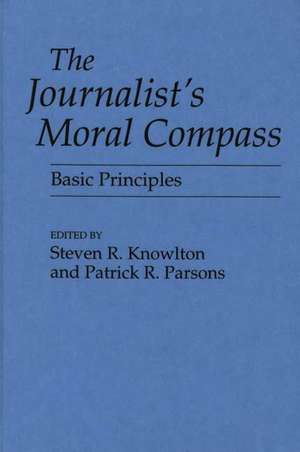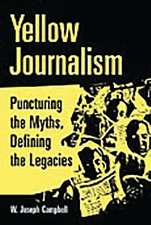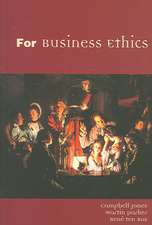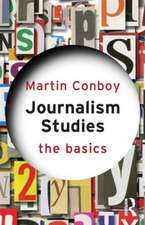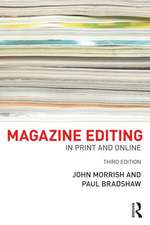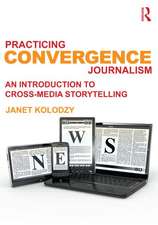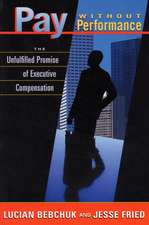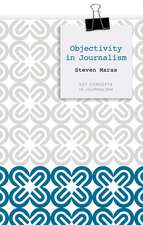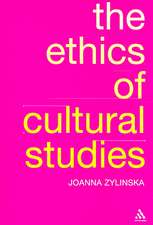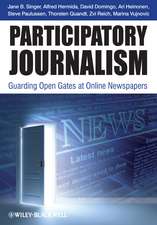The Journalist's Moral Compass: Basic Principles
Autor Steven Knowlton, Patrick Parsonsen Limba Engleză Hardback – 29 noi 1993 – vârsta până la 17 ani
| Toate formatele și edițiile | Preț | Express |
|---|---|---|
| Paperback (1) | 173.53 lei 6-8 săpt. | |
| Bloomsbury Publishing – 23 ian 1995 | 173.53 lei 6-8 săpt. | |
| Hardback (1) | 438.41 lei 6-8 săpt. | |
| Bloomsbury Publishing – 29 noi 1993 | 438.41 lei 6-8 săpt. |
Preț: 438.41 lei
Preț vechi: 708.12 lei
-38% Nou
Puncte Express: 658
Preț estimativ în valută:
83.92€ • 91.18$ • 70.54£
83.92€ • 91.18$ • 70.54£
Carte tipărită la comandă
Livrare economică 21 aprilie-05 mai
Preluare comenzi: 021 569.72.76
Specificații
ISBN-13: 9780275945374
ISBN-10: 0275945375
Pagini: 272
Ilustrații: index
Dimensiuni: 156 x 235 x 16 mm
Greutate: 0.55 kg
Ediția:New.
Editura: Bloomsbury Publishing
Colecția Praeger
Locul publicării:New York, United States
ISBN-10: 0275945375
Pagini: 272
Ilustrații: index
Dimensiuni: 156 x 235 x 16 mm
Greutate: 0.55 kg
Ediția:New.
Editura: Bloomsbury Publishing
Colecția Praeger
Locul publicării:New York, United States
Notă biografică
Steven R. Knowlton, assistant professor of journalism at Pennsylvania State University with a PhD in history, worked for more than twenty years as a reporter and editor for six different newspapers around the country and for United Press International and as a press aide on a presidential campaign. His most recent book is Popular Politics and the Irish Catholic Church (1991).Patrick R. Parsons is associate professor of communications at Pennsylvania State University with his doctoral degree in journalism and mass communications. His recent publications include Milestones in Cable Television USA (1990) and Cable Television and the First Amendment (1987). He has written at length on ethical issues for journalists and on their roles in society.
Cuprins
IntroductionPolitics: The Press and the StateJohn Milton, Areopagitica, 1644Thomas Hobbes, Leviathan, 1651John Locke, On Civil Government: The Second Treatise, 1691"Cato" (John Trenchard and Thomas Gordon) Cato's Letters, 1720Tunis Wortman, A Treatise Concerning Political Enquiry and the Liberty of the Press, 1801Maximilien Robespierre, Liberty of the Press, National Gazette, 1791John Stuart Mill, On Liberty, 1859Samuel Warren and Louis Brandeis, "The Right to Privacy," Harvard Law Review, Dec. 15, 1890Philosophy: The Press and the TruthPlato, "The Allegory of the Cave," The Republic, 386-367 B.C.Francis Bacon, Novum Organum, 1620Walter Lippmann, Public Opinion, 1922Warren Breed, "Social Control in the Newsroom," Social Forces, (33:4) May 1955Suzanne Pingree and Robert Hawkins, "News Definitions and Their Effects on Women," Women and the News, 1978Daniel J. Boorstin, The Image, 1964Sissela Bok, Lying, 1979Economy: The Press and the MarketAdam Smith, An Inquiry into the Nature and Causes of the Wealth of Nations, 1776Karl Marx, A Contribution to the Critique of Political Economy, 1859James Gordon Bennett, "To The Public--Enlargement of the "Herald"," New York Herald, Jan. 1, 1836: Horace Greeley, "A Great Journalist Dead," New York Tribune, June 3, 1872Joseph Pulitzer, "The Great Issue," St. Louis Post and Dispatch, Jan. 10, 1879Upton Sinclair, The Brass Check, 1920A.J. Liebling, "Prologue: The End of The Free Lunch," The Press, 1961Ben Bagdikian, "The Lords of the Global Village, The Nation, June 12, 1989The Commission on Freedom of the Press, (The Hutchins Commission), A Free and Responsible Press, 1947John Merrill, The Imperative of Freedom, 1974 ConclusionAppendix: Society of Professional Journalists "Code of Ethics", 1987
Recenzii
This book does not claim to offer any simple solutions; rather, it is a succinct-yet exhaustive-attempt to introduce readers to the crucial issues from a historical perspective. . . . The editors' lucid introductions provide clarification. In an age of mass media characterized by a propensity for stooping to serve the lowest common denominator-given expression in such pseudojournalism as The National Enquirer and A Current Affair-- it is refreshing to rediscover the field's noble roots.
A valuable collection of readings that will put anyone in touch with thinking on ethics from John Milton to Karl Marx to James Gordon Bennett to A.J. Liebling. The richness of these sources is what gives the book its value. . . . The book is rich in seminal ideas, and is ideal for the student of ethics. And doesn't that include all of us?
An extremely helpful map of the journalism ethics territory.
[S]hould be a worthwhile addition to the library of most media ethics professors.
A valuable collection of readings that will put anyone in touch with thinking on ethics from John Milton to Karl Marx to James Gordon Bennett to A.J. Liebling. The richness of these sources is what gives the book its value. . . . The book is rich in seminal ideas, and is ideal for the student of ethics. And doesn't that include all of us?
An extremely helpful map of the journalism ethics territory.
[S]hould be a worthwhile addition to the library of most media ethics professors.
